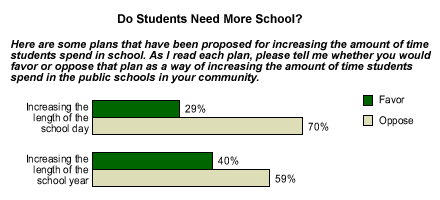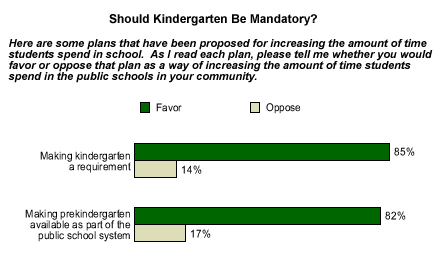Just as Japanese parents and children are adjusting to a shorter school week -- the public schools discontinued Saturday classes last April -- American educators continue to consider a range of options for lengthening the time children spend in classrooms. When asked in the 2002 Phi Delta Kappa/Gallup poll* about several plans to increase the amount of time U.S. students spend in school, only 29% of Americans favor increasing the length of the school day; a more substantial minority -- 40% -- say they would like to see the length of the school year increased.

School districts have experimented with rescheduling for different reasons -- among them alleviating overcrowded conditions, saving money, or more thoroughly preparing children for standardized testing. In most cases, public school scheduling reflects ideas about educational quality.
The majority of schools in Western Europe, for example, follow a plan known as "year-round school." Ominous as that may sound to children and parents, it's not really "year-round" -- just the same number of school days per year (approximately 180 days in the United States and 195 days in Europe) broken into three or four vacation segments plus a six-week summer break. According to the National Association for Year-Round Education, there are more than 3,000 public schools that operate on a year-round calendar in the United States.
Students and teachers who have attended and taught school on both sides of the Atlantic seem to see benefits in the year-round system. Peter, a British student who attended school in England and New Jersey, said, "My best memory of school in the States was the long summer holiday with all the outdoor adventures. But now that I'm older and the academic workload is more intense, it's always nice to have a holiday just over the horizon."
Hans Skuballa, a German math teacher who has taught in the United States and in Hamburg, Germany, agrees with those who favor extending the academic year. "As a visitor to your country, we loved the long summer vacation for traveling, but as an educator, I would definitely say the German schedule works better for learning. After seven or eight weeks of continuous teaching, you can really feel the kids' lack of concentration coming into play," Skuballa commented. "After the summer vacation, it would take the students about six weeks to review and re-learn the material before I could carry on teaching the curriculum."
The poll shows that Americans with higher levels of education appear to be somewhat more in favor of additional academic time -- 33% of those who attended college favor lengthening the school day compared to just 22% of those with a high school education. By the same token, 46% of those with a college education favor lengthening the school year compared to 32% of those with no college.
Preschool, Then Kindergarten
Less controversial than year-round education is the notion that American kids should start their educational experience early. Although the majority of Americans do not want to alter the length of the school day or year, they do strongly support increasing academic time by guaranteeing kindergarten participation and extending a pre-kindergarten experience to all children.

Key Points
Clearly, there's no single "right" way to schedule the academic day or calendar. Many will argue that the definition of education can easily expand to activities that occupy kids' time during a long summer vacation -- camping, traveling, sitting under a tree reading, and spending time with family in other parts of the country. And there are many other considerations. Telma Koch, a teacher from Chile who attended high school in both Santiago and Wisconsin and now teaches high school in Poughkeepsie, N.Y., sums up the differences in global scheduling this way: "What's best for educating kids depends on so many things -- history, culture, finances and especially the weather. In Spain and Africa, they have very long summer breaks because it would be impossible for kids to learn in the intense summer heat -- and air conditioning all those buildings would be prohibitively expensive."
*The findings from the 2002 Phi Delta Kappa/Gallup poll are based on telephone interviews with a randomly selected national sample of 1,000 adults, aged 18 and older, conducted June 5-26, 2002. For results based on this sample, one can say with 95% confidence that the maximum error attributable to sampling and other random effects is ±3%.